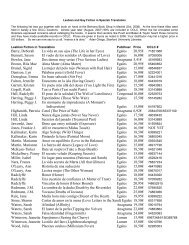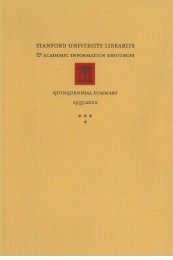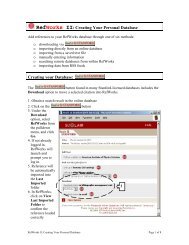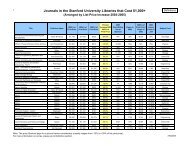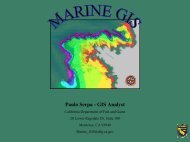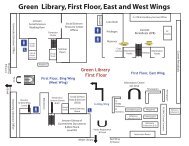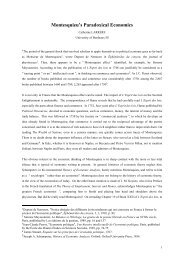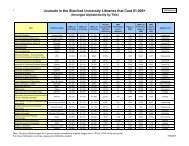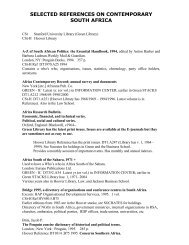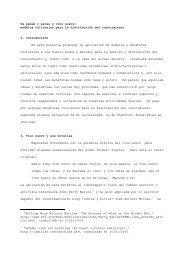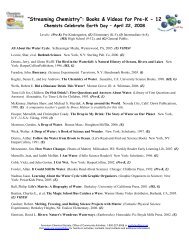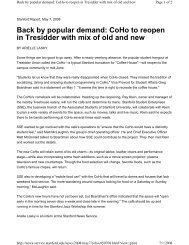The Abbé de Saint-Pierre and the Emergence of the 'Quantifying ...
The Abbé de Saint-Pierre and the Emergence of the 'Quantifying ...
The Abbé de Saint-Pierre and the Emergence of the 'Quantifying ...
You also want an ePaper? Increase the reach of your titles
YUMPU automatically turns print PDFs into web optimized ePapers that Google loves.
Abbé <strong>Saint</strong>-<strong>Pierre</strong> <strong>and</strong> <strong>the</strong> “Quantifying Spirit” 24<br />
Malebranche circle, gui<strong>de</strong>d by l’Hôpital <strong>and</strong> Varignon, began to systematically explore <strong>the</strong> new<br />
science <strong>of</strong> analytical mechanics suggested by Newton’s work.<br />
A <strong>de</strong>tailed history <strong>of</strong> analytical mechanics in France is not necessary for un<strong>de</strong>rst<strong>and</strong>ing<br />
<strong>Saint</strong>-<strong>Pierre</strong>’s political science. 51 Instead, <strong>the</strong> general features which shaped his quantitative<br />
approach to political science can be isolated. <strong>The</strong> emphasis upon number, while apparently<br />
obvious, is in fact <strong>the</strong> most significant. <strong>The</strong> early efforts by Colbert <strong>and</strong> o<strong>the</strong>rs to amass<br />
“statistics,” or state information, had <strong>of</strong> course been rooted in an epistemological belief in <strong>the</strong><br />
value <strong>of</strong> empirical, scientific fact ga<strong>the</strong>ring. But <strong>the</strong>se efforts were not necessarily rooted in a<br />
conception <strong>of</strong> quantitative data collection or in an epistemological belief that number <strong>and</strong><br />
ma<strong>the</strong>matics were powerful tools for satisfying <strong>the</strong>se utilitarian agendas. When asked to do a<br />
new census <strong>of</strong> <strong>the</strong>ir region, for example, as royal intendants were <strong>of</strong>ten asked to do un<strong>de</strong>r<br />
Colbert, many respon<strong>de</strong>d by giving narrative accounts which highlighted <strong>the</strong> natural features <strong>of</strong><br />
<strong>the</strong> region, its people, <strong>and</strong> customs along with discursive presentations <strong>of</strong> <strong>the</strong> region’s major<br />
resources, industries, <strong>and</strong> agricultural products. In presenting <strong>the</strong> empirical features <strong>of</strong> France in<br />
this non-quantitative way, moreover, <strong>the</strong> intendants were on <strong>the</strong> whole fulfilling <strong>the</strong> expectations<br />
<strong>of</strong> <strong>the</strong> ministers in charge <strong>of</strong> <strong>the</strong>se initiatives. 52<br />
As <strong>the</strong> seventeenth century waned, however, a new interest in quantification began to<br />
take hold within <strong>the</strong> fledgling world <strong>of</strong> statistics. <strong>The</strong> pioneering work <strong>of</strong> William Petty in this<br />
regard has been well documented, <strong>and</strong> his “political arithmetic” as he called it did circulate in<br />
France <strong>and</strong> exert an influence on people like <strong>Saint</strong>-<strong>Pierre</strong>. But France also had its own<br />
indigenous tradition <strong>of</strong> quantitative statistical science even if it has not been as thoroughly<br />
studied. <strong>The</strong> historical obscurity <strong>of</strong> French quantitative statistics stems largely from <strong>the</strong> fact that<br />
<strong>the</strong> practitioners were rarely book-writing savants but instead royal administrators serving in <strong>the</strong>



